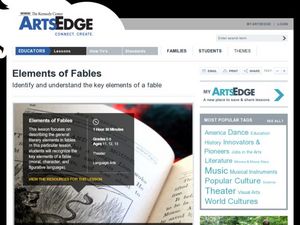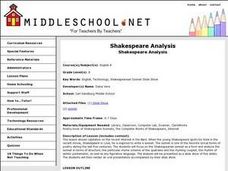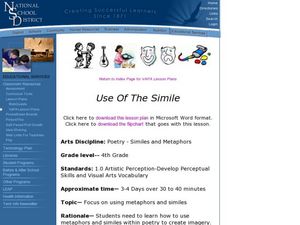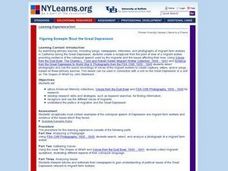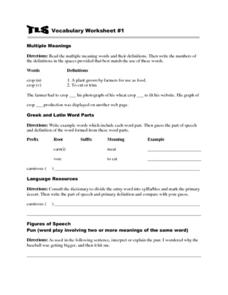EngageNY
Analyzing Word Choice: Atticus’s Closing Speech (Chapters 20-21)
Choose your words carefully. Scholars begin by reading a line of Atticus's closing speech in To Kill A Mockingbird. Readers work independently on their note catchers, then complete a Think-Pair-Share activity with partners. They finish...
City College of San Francisco
Making Inferences: Reading Between the Lines
Have you ever read part of a story and had to figure out what the rest was about? Practice making inferences with several short passages and multiple choice questions.
Orange Or Apple
Flashcards Deluxe
A useful study tool, learners create decks or download pre-made decks to review. The app tracks your progress and allows you to customize your experience with each deck. Why not try it out and test yourself and your pupils on thousands...
Shodor Education Foundation
Cross Section Flyer
Scholars see cross sections come to life using an app to investigate cross sections of three-dimensional solids. They look at prisms, pyramids, cylinders, cones, and double cones.
Shodor Education Foundation
Squaring the Triangle
Teach budding mathematicians how to square a triangle with an interactive that shows a graphical proof of the Pythagorean Theorem. Pupils alter the lengths of the legs using sliders. Using the inputted lengths, the applet displays the...
Curated OER
Teaching Imagery with Gary Paulsen
Students read excerpts from memoirs written by Gary Paulsen as examples of how to write a narrative piece. They identify figurative language used and then they write a memoir of their own that contains imagery and figurative language.
Curated OER
Figurative Language Alive: Balcony Scene Charades
Students act out lines from Romeo and Juliet in a charade-like game.
Curated OER
Daily Oral Language Activities: Idioms
Third graders examine the use of idioms. In this vocabulary and reading lesson, 3rd graders explore what idioms are and make their own idiom cards to help them understand the use idioms in language.
Curated OER
It's All Poetry to Me!
Fourth graders explore language arts by analyzing poetry styles. In this writing analysis lesson, 4th graders read several sample poems in class and identify similes, metaphors and other figurative language within them. Students analyze...
Curated OER
Literary Lingo
Students make connections between reading and writing. In this language arts lesson, students explore literary elements as they examine a number of texts and practice implementing figurative language into their writing.
Curated OER
Elements of Fables
Students explore the attributes of fables. In this literature instructional activity, students read several fables and identify the moral instructional activity, characterization, and figurative language in each. Students then retell...
Curated OER
Shakespeare Analysis
Eighth graders focus on the Shakespearian sonnet as a form and analyze the sonnet in terms of structure, the particular rhyme scheme of the quatrains and the rhyming couplet, the rhythm of iambic pentameter, as well as any figurative...
Curated OER
Similes
A simile is a non literal phrase that needs to be deciphered for contextual meaning. Similes are also fun to read and write. Third graders get cozy with similes found in the book If You Hopped Like a Frog by David M. Schwartz. They use...
Curated OER
Use of the Simile
Fourth graders identify and write their own similes. In this literary devices instructional activity, 4th graders define and identify similes. The teacher scaffolds the instructional activity so that all students can write their own...
Curated OER
Imagine That! Analyzing Imagery
Poems by O. Henry, Marion Dane Bauer, Monty Roberts, and Langston Hughes provide the text for a study of symbolism, hyperbole, and imagery. Employing the “think-pair-share” strategy learners generate definitions of these terms and locate...
Curated OER
Geometric Figures-Triangles
Fourth graders explore triangles. In this math lesson, 4th graders discuss the different types of triangles. Students create triangles using wiki sticks. Students complete an online matching game.
English Enhanced Scope and Sequence
Media Literacy Applied
After investigating various forms of print, oral, and electronic media as sources of information, class members research a historical figure and produce a résumé for this person. While templates are provided for an initial sorting...
Curated OER
Figuring Somepin 'Bout the Great Depression
Students conduct research from primary and secondary resources in order to help with comprehension of the time period of The Great Depression in American History. The examination of literature is also used in this instructional activity.
Polk Bros Foundation
Meet the Nonfiction Main Idea Challenge
Help your class develop the ability to determine a main idea with a packet of materials that you can introduce and use over a period of time. The packet includes some information for the teacher and rationale for the exercises. There are...
Curated OER
History Personified
Students explore historical events by writing a research paper using personification.
Pennington Publishing
Vocabulary Worksheet #1 & #2
These two worksheets cover several grammatical topics. Pupils work on words with multiple meanings, Greek and Latin word parts, word connotations, academic language, and more. The result is seven quick exercises that could be used...
ESL Kid Stuff
Measuring Parts of the Body
"How tall are you?" "Who has the longest arms?" As part of a study of the names of various body parts, language learners use rulers and tapes to measure parts of the body.
Polk Bros Foundation
Punctuation Signals
Choose any passage that uses punctuation effectively and analyze it with your class. Learners read the passage out loud once, ignoring the punctuation. Then they read it again, but this time paying attention to all of the punctuation....
Curated OER
My Antonia: Magic Squares (Vocabulary Strategy)
Help your pupils discover the power of context clues by teaching the this vocabulary strategy. Designed to go with words from Willa Cather's My Antonia, this exercise focuses on having individuals use their own words to define new...












